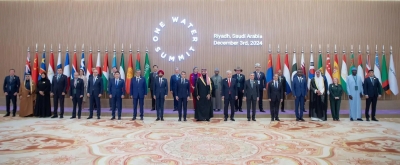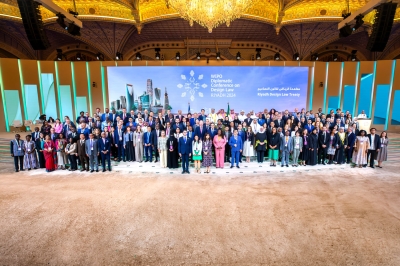
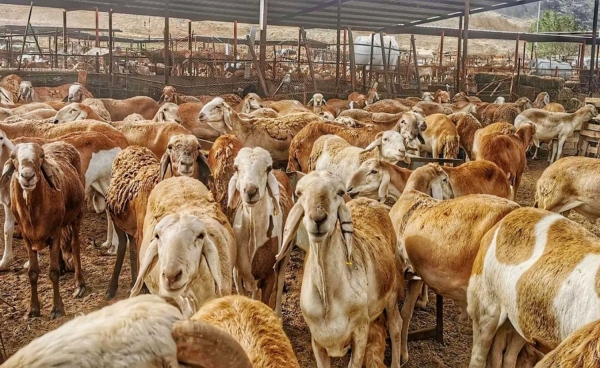
Livestock in the Kingdom of Saudi Arabia is one of the economic resources in the Kingdom. It includes domesticated and tame animals like camels, horses, cattle, sheep, birds, bees, and similar animals, excluding wild creatures.
Sheep farming in Saudi Arabia
It is a historically long-standing activity in the Kingdom, as people have traditionally raised sheep due to their ability to adapt to different environments and the straightforward process of extracting and selling their products, including meat, milk, wool, and leather. Sheep are domesticated herbivorous mammals.
Sheep are among the preferred sacrificial animals for Muslims during Eid al-Adha. During this time, livestock markets in the Kingdom witness a significant increase in the buying and selling of sacrificial animals.
Supporting sheep farming in Saudi Arabia
The Ministry of Environment, Water, and Agriculture supports sheep farming and its markets through the Agricultural Development Fund. This profession is widespread in the Kingdom, considered one of the self-employed trades.
The ministry collaborates with the Saudi Food and Drug Authority to develop and set technical regulations and standards for animal feed used for livestock, including sheep, and to monitor its quality. They also establish uniform pricing for veterinary medicines and create conditions and mechanisms for working in this profession.
Livestock farmers in the Kingdom who own between fifty and 250 head of livestock are classified as small-scale farmers, and specific programs have been set up to support their work.
Goat farming in Saudi Arabia
Goat farming is widespread in the mountainous regions of the Kingdom, particularly in the southern and western areas. The rugged terrain of these regions limits the herders' ability to fully utilize the pastoral resources, making goat farming the most suitable option for grazing in such lands.
Camel farming in Saudi Arabia
Camel farming has long been intertwined with the traditional lifestyle of most of the population. It is a profession that Saudis have practiced and passed down through generations. Scientifically, camels are domesticated herbivorous mammals. In the Kingdom, they are raised in herds in the wild or within specially prepared enclosures for trade purposes and to benefit from their meat, milk, and wool. They offer several economic advantages and serve as a prominent symbol in the nation's cultural heritage.
As of 2022, the number of camels in the Kingdom reached approximately 1.8 million, spread across all regions of the Kingdom. Their ownership extends to about eighty thousand people. About 76,000 t of camel meat is consumed annually, with a per capita consumption rate of 2.2 kg per year, according to statistics from the Ministry of Environment, Water, and Agriculture.
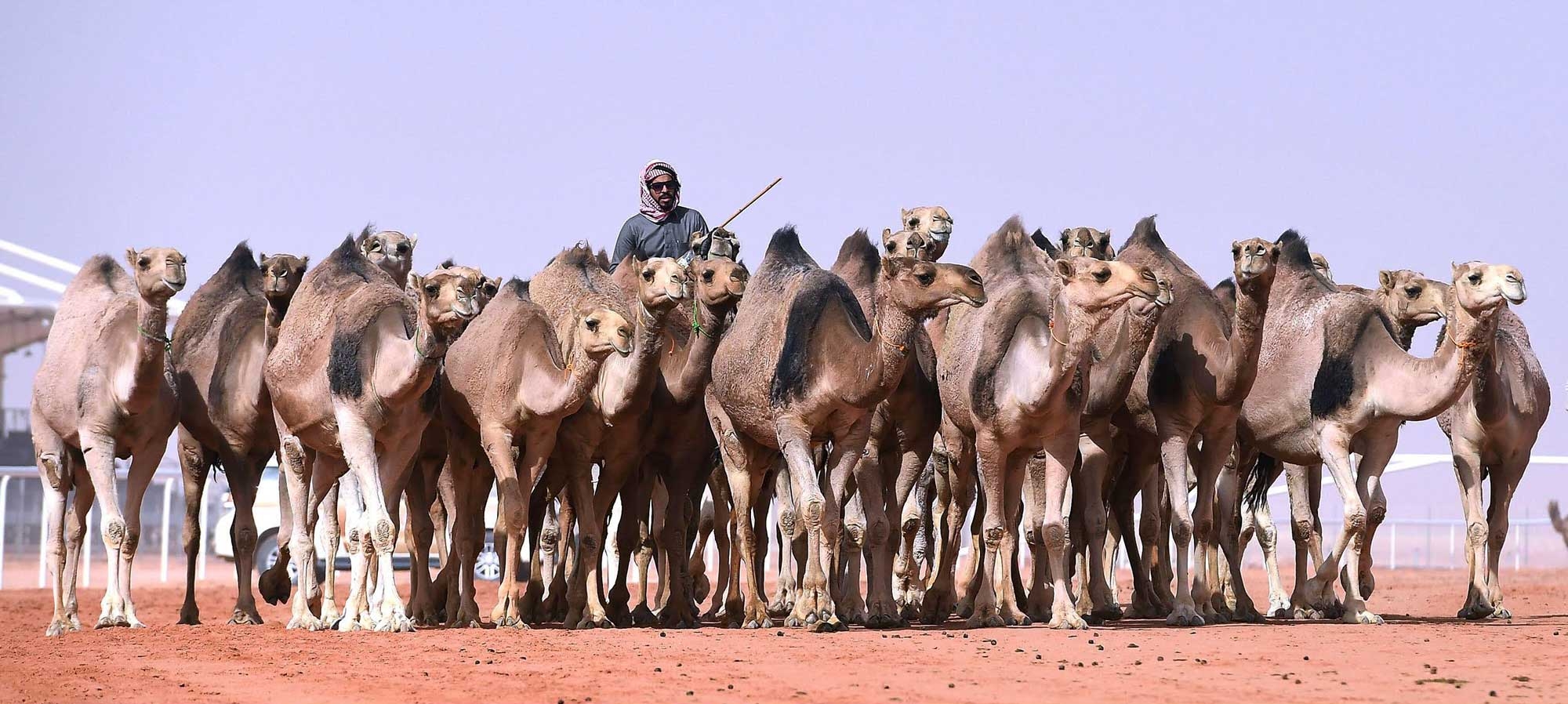
Camel categories in Saudi Arabia
Several breeds of camels are raised in the Kingdom, including the Majahim, Maghatir, and Humr categories, which are found throughout the Kingdom. Majahim camels are most common in central and southeastern of the Kingdom, known for their large size and high milk production. The Maghatir breed is prevalent in the northern and central regions of the Kingdom, smaller in size with lower milk production, and less numerous than Majahim camels. When grazing naturally, camels require six to twelve hours and cover long distances. Spring and fall are the best seasons for fattening camels, as grazing conditions improve and the nutritional value of plants increases during these times.
The Majahim camels come in a variety of colors. The Sawdah camels have deep black fur. The Milhah camels have slightly lighter black fur. The Sahba camels have primarily black fur with some reddish-brown hair mixed in. The Safra camels are predominantly yellow, lighter in color than the Sahba.
The Maghatir camels, known as white camels (Wadh) or grey camels (Shahba), come in several colors. Wadha camels have pure white fur. Shaqha camels lean toward light brown and are less white than the Wadh. Sha'la camels have dark brown fur, making them darker than the Wadh.
The basics of camel farming in Saudi Arabia
Camel breeders in the Kingdom provide proper rearing conditions, good nutrition, and climates conducive to healthy camel growth. Camel development varies depending on the breed, genetic factors, surrounding environmental conditions, and rearing methods. Breeders are keen to learn and follow the best practices for managing camel growth effectively.
Camels have distinct reproductive characteristics compared to other animals. Their pregnancy lasts between twelve and thirteen months, and the best mating periods occur annually in January, February, and March.
Camel feeding in Saudi Arabia
Camels graze in a variety of native environments, especially in deserts. Their diet includes shrubs and grasses with low nutritional value and high salinity, as well as thorny plants that other livestock cannot consume. Their split upper lip allows them to graze on such plants efficiently and benefit from them. Additionally, camels can ruminate and drink salty water.
When grazing, camels tend to pick the upper parts of trees and plants, which helps preserve the pasture and prevents its degradation, unlike the grazing habits of other livestock like sheep and goats. If natural pastures are unavailable, they are fed concentrated fodder.
Characteristics that help in camel farming in Saudi Arabia
Camels are known for their adaptation to desert environments and their ability to endure thirst, going up to two weeks without drinking water while maintaining bodily functions. They can survive even after losing around 40 percent of their water content. This resilience is due to the hump that stores water, and their fur, which reduces evaporation and shields the camel's body from the sun. Moreover, numerous sweat glands spread across their bodies release sweat directly under the fur and onto the skin's surface, cooling the body through evaporation.
Camel diseases
The desert environments in the Kingdom offer suitable climates for camel growth and naturally isolate them from the spread of viral diseases that can hinder their growth. This is largely due to the wide distances between different herds. Additionally, their grazing methods, patterns, and habits help maintain their health. However, the spread of diseases among camels is often due to their movement across different grazing areas and interaction with other camels.
Viral diseases affecting camels include smallpox, rabies, and foot-and-mouth disease. Bacterial diseases include Malta fever (brucellosis), tetanus or clostridial infection, mastitis, metritis, tuberculosis, septicemia, pasteurellosis, and salmonellosis.
Camels often gather in groups during winter, making them susceptible to fungal diseases like ringworm. Despite their natural resilience, desert life can weaken their immune systems and increase vulnerability to parasitic diseases, such as trypanosomiasis, gastrointestinal and intestinal worms, nasal bots, lungworms, hydatid cysts, ticks, and mange.
Camel meat and milk in Saudi Arabia
Camel meat production in the Kingdom accounts for about 9 percent of meat production across the Arab world. Calves meat (hashi) is one of the most popular meats among local consumers. Camel milk, especially from she-camels that have recently given birth, is culturally linked to hospitality traditions in certain provinces of the Kingdom, where it is served with dates to guests. Its importance and demand have grown due to the belief in traditional medicine that it can cure many diseases.
Several factors influence camel milk production, such as the camel breed, consistent milking routines, and health issues such as mastitis, wounds, or tumors in the udder. A good milking camel can be identified by various characteristics, such as resistance to diseases, a strong appetite for feed, a long neck, and a broad head and chest. Its udder should be healthy, large, evenly quartered (teats), and have a good texture without visible defects or fibrosis.
Horses in Saudi Arabia
The Kingdom places great importance on Arabian horses, ensuring their proper breeding and training. Stables are set up according to specific regulations for licensing. The Arabian Peninsula is known as the homeland of purebred Arabian horses, and they represent a rich historical and cultural heritage for Saudis. The country encourages equestrian sports by organizing horse races, establishing, and financially supporting equestrian clubs across all provinces. These efforts aim to care for purebred Arabian horses, encourage their breeding, preserve the Islamic and Arab equestrian heritage, and train the younger generation in equestrian skills.
King Abdulaziz Arabian Horse Center
The center is the official entity responsible for registering Arabian horses in the Kingdom and representing them in international organizations. It monitors births and imported horses across all provinces, focusing on improving breeding, production, and care. The center provides technical advice and coordinates with international organizations to plan and implement information systems and import/export regulations. Additionally, it is responsible for visitors and enthusiasts of Arabian horses.
The King Abdulaziz Arabian Horse Center is located in Dirab, southwest of Riyadh. The center houses the pure descendants of the Founding King's horses, along with a collection of other purebred Arabian horse lineages. This helps ensure continued production and trait improvement while preserving the ancient Saudi horses that trace back to known pedigrees in the Arabian Peninsula.
Equestrian Authority
The decision to establish the Equestrian Authority was made in April 2020, giving it the responsibility to develop the equestrian sector in the Kingdom. This is to be done in collaboration with relevant entities, aligning with the cultural value and connection of equestrian activities to national heritage and culture. The authority aims to promote the desired sports, cultural, social, and economic interests and enhance the Kingdom's international standing in various equestrian fields. The authority is organizationally linked to the Prime Minister, and the chairperson is appointed by royal order. It has legal personality, and financial and administrative independence.
Cattle farming in Saudi Arabia
It is one of the livestock activities in the Kingdom and an extension of traditional farming practices. Over time, it has become an industrial activity due to the expansion of cattle farming and the introduction of modern machinery, product distribution vehicles, and retail outlets.
The cattle farming sector in the Kingdom saw growth in the number of cattle and dairy production until 1975. However, there was no increase in the number of projects until the early 1990s, indicating improvements in industrial production methods and consideration for natural environments and suitable cattle farming locations as a significant factor. High humidity levels can impact dairy farm and product development. Therefore, the Eastern Province and Riyadh Province had the highest cattle distribution due to their favorable climates for the industry and the presence of modern cattle farming projects.
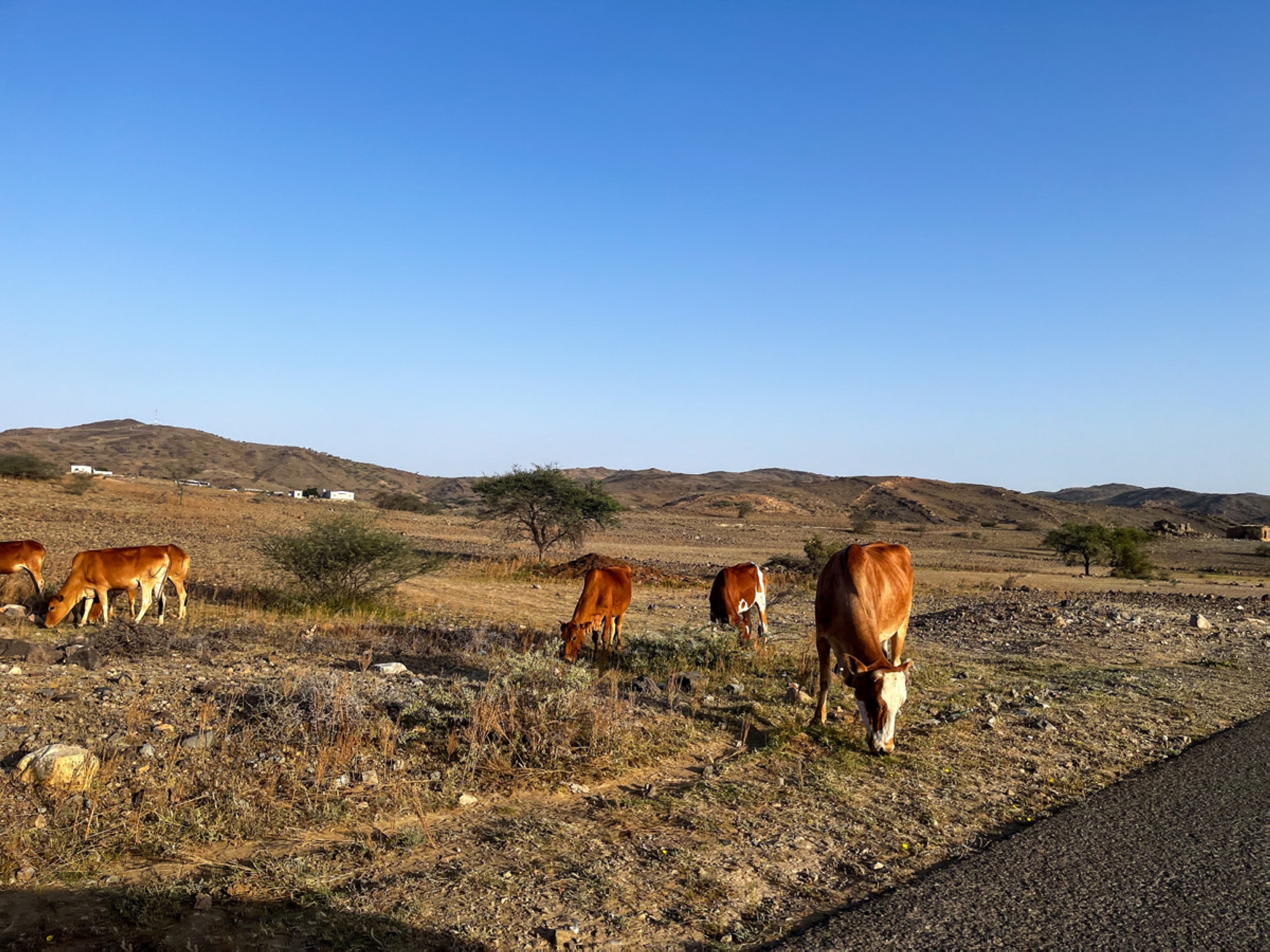
Interest in cattle farming in Saudi Arabia
The Kingdom has shown a significant interest in cattle farming, with the dairy production sector becoming more specialized over the past decades. Dairy manufacturing, production, and distribution companies have experienced growth, allowing local firms to excel in this sector. The Kingdom has supported this development through various supporting programs, such as the Small Livestock Breeders Support Program. This program provides financial support to small-scale cattle breeders, with monthly aid amounting to approximately SAR2.2 million as of 2020.
Genetic improvement of cattle in Saudi Arabia
A project for genetic improvement in cattle was launched in 2021 using modern genetic technologies. It aims to support and encourage dairy projects, achieve food security and sustainable development, reduce operational costs, increase production efficiency, and select animals with fewer diseases and higher economic returns.
Sources and statistics for cattle farming in Saudi Arabia
Several statistics have been compiled to monitor the cattle farming sector in the Kingdom. A field survey covering specialized cattle farms across all administrative provinces of the Kingdom collected comprehensive data on these farms. The statistics for 2021 showed that specialized cattle farms in the Kingdom housed a total of 414,990 head of cattle. The survey also revealed that the total volume of raw cow milk produced in these specialized farms for the same year amounted to 3 billion L.
The cattle farming activity is not limited to companies alone; government support is also extended to livestock breeders who have between fifty and 250 head of cattle. Their farming activities are financed as part of short-term credit services but are subject to the conditions set by the Ministry of Environment, Water, and Agriculture.
Bird and poultry farming in Saudi Arabia
Birds and poultry farming is among the activities supported by the Ministry of Environment, Water, and Agriculture in the Kingdom. The country ranks third globally in the consumption of poultry meat and products.
In the Kingdom, the broiler chicken production cycle lasts thirty-two days. During this period, a feed mixture containing 23 percent crude protein and 3,200 calories is used. In the growing chick stage, when chicks are between four and six weeks old, a mixture containing 20 percent crude protein and 3,200 calories is given. In the final "finisher" stage, the feed mixture has about 18 percent crude protein and 3,200 calories. After this cycle, farmers can transfer the broiler chickens to processing plants for preparation and delivery to consumers.
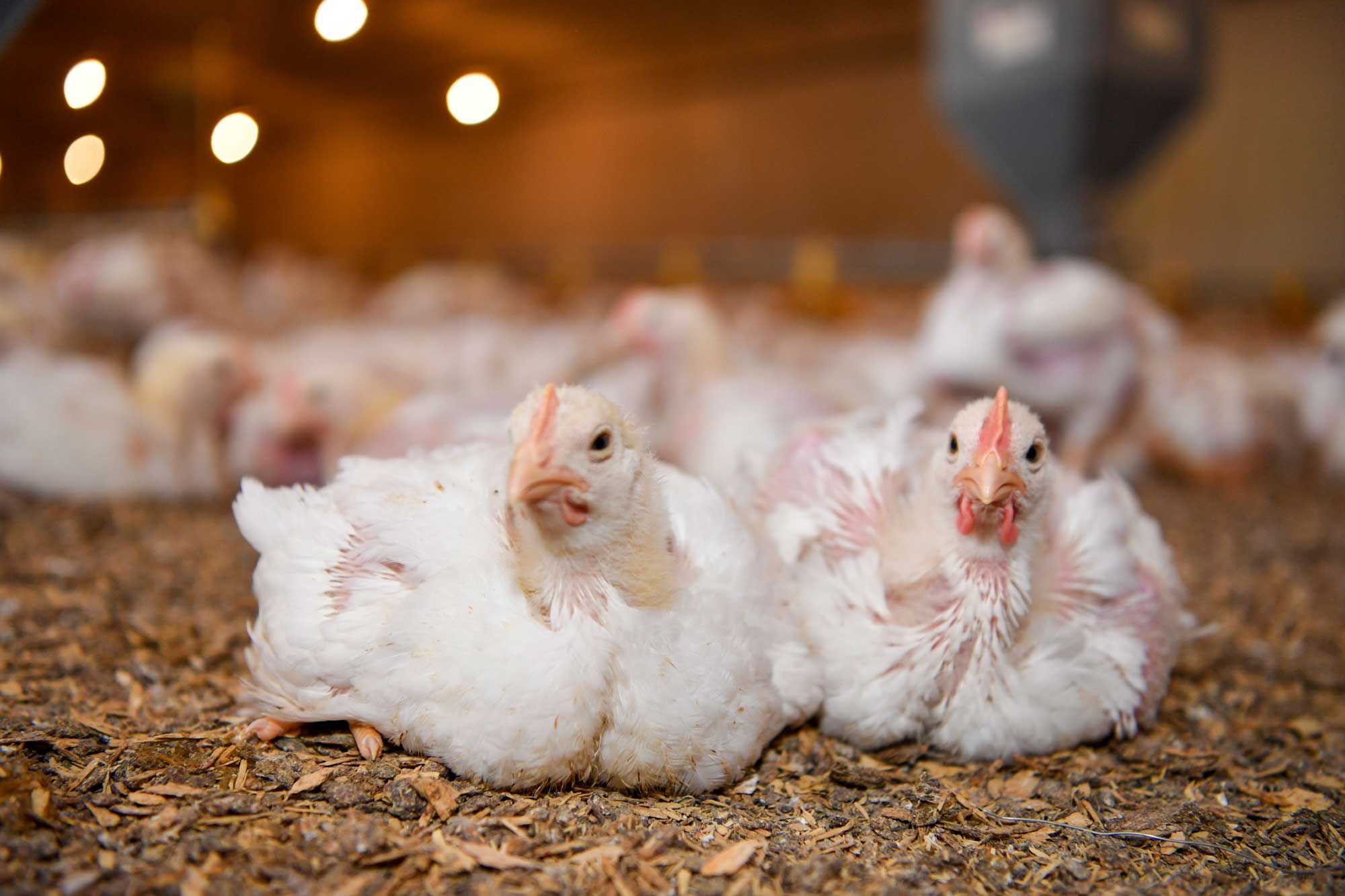
The Middle East Poultry Expo
The Ministry of Environment, Water, and Agriculture in the Kingdom organized the first edition of the Middle East Poultry Expo in 2022. It is a specialized exhibition focused on the poultry industry and featured participation from 150 exhibitors representing thirty countries.
In its second edition in 2023, the Middle East Poultry Expo saw participation from 207 exhibitors representing thirty-seven countries. The event attracted ten thousand visitors from fifty-four countries.
The Kingdom annually produces 995,000 t of broiler chicken, 406,000 t of table eggs, around 1.3 billion birds, and 5.4 billion eggs. The Kingdom invests in innovative solutions to address regional challenges in poultry production and meet the growing demand for poultry products. In 2021, self-sufficiency in egg production reached 112 percent, and 66 percent for poultry meat.
Saudi SGAP system
The Ministry of Environment, Water, and Agriculture in the Kingdom implemented the Saudi Good Agricultural Practices (SGAP) system.
The Ministry of Environment, Water, and Agriculture has outlined standards for poultry farms that include: providing potable water, clarifying the feed system, conducting inspections and monitoring, gathering and transporting birds, procedures for culling infected birds, medicinal treatments, egg hatching, ensuring suitable poultry housing, monitoring waste, pest control programs, proper care practices, and supervising farm workers.
Licensing of poultry farming projects in Saudi Arabia
In 2021, the number of operational and construction licenses in the poultry sector reached 275, including 178 operational licenses and ninety-seven construction licenses. This also includes 119 projects for broiler chicken production and pigeon farming, twenty-six projects for egg production, and twelve projects for rearing and producing broiler parent stock, with hatcheries operating at a production capacity of 480.5 million chicks per year.
The projects licensed by the Ministry of Environment, Water, and Agriculture included six projects for operating chicken hatcheries with a production capacity of 344.7 million chicks annually, along with two pigeon farming projects to produce 710,000 birds annually. Additionally, there was a project for rearing and producing broiler grandparent stock and operating hatcheries to produce ten million chicks per year, five projects for the production of chilled and frozen poultry, rabbits, and birds with a capacity of sixty thousand birds per hour, four projects for the production of fresh poultry, rabbits, and birds with a capacity of 17.9 thousand birds per hour, and three projects to operate slaughterhouses, processing poultry, rabbit, and bird meat with a capacity of 18.5 thousand birds per hour.
Falcons in Saudi Arabia
Falcon breeding in the Kingdom is deeply tied to popular and cultural heritage. In 2010, falcon breeding was inscribed on the United Nations Educational, Scientific, and Cultural Organization (UNESCO) Intangible Cultural Heritage List.
Falconry represents one of the most traditional hobbies in the Kingdom. It has been officially regulated since 1975.
The Kingdom ranks first in the world for the number of falconers and falcon owners, with approximately twenty thousand falconers.
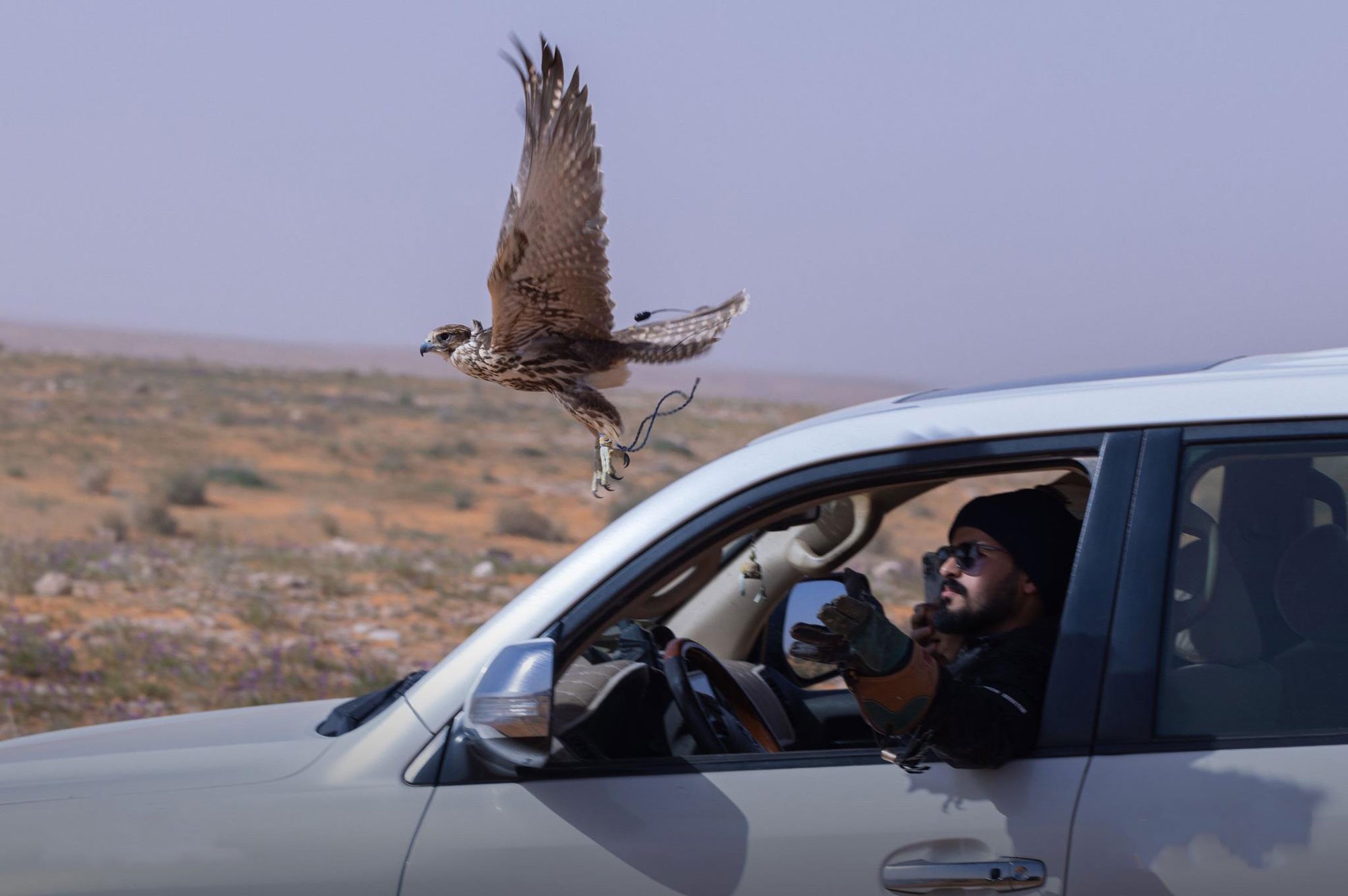
History of falcons in Saudi Arabia
Archaeological discoveries at al-Maqar site near Wadi ad-Dawasir have documented that the people of the Arabian Peninsula domesticated falcons nine thousand years ago, during the Neolithic period.
Types of falcons according to species
Falcons are divided into dozens of species that vary in size, weight, feather color, speed, and flight capability. These different species inhabit various geographical and climatic regions, from extremely hot deserts to icy cold areas. However, researchers classify falcons scientifically into four main types: the Saker falcon, Gyrfalcon, Peregrine falcon, and Lanner falcon.
The role of Saudi Arabia in preserving falcon species
The Kingdom is a habitat for various species of falcons and a passageway for migratory ones. To preserve falcon species from extinction, the Kingdom has joined international agreements related to the protection of falcons from extinction and the protection of migratory birds.
The Saudi Falcon Club works to preserve falcon species and protect them from extinction. This effort is in collaboration with the Special Forces for Environmental Security and the National Center for Wildlife, aiming to prevent the hunting of endangered falcon species.
The Kingdom has launched several programs to protect falcons, including the "Hadad" program, which aims to return rare falcons to their original habitats. This initiative helps preserve falcon species and prevent their extinction while supporting environmental balance and wildlife. The program has released thirty-three falcons across fifteen different sites and revived twenty-eight nests, resulting in the hatching of seventy-three chicks.
These falcons include endemic species (the Peregrine Falcon and the Lanner Falcon) and migratory species (the Saker Falcon and the Peregrine Falcon).
The "Hadad" program follows several steps for implementation: pre-release, where falcons undergo examinations and release sites are visited to be environmentally assessed; preparation for release, involving training to ensure adaptation and breeding readiness; environmental verification, checking the suitability of resources, threats, and climate; the release phase, where endemic (Peregrine Falcon and Lanner Falcon) and migratory (Saker Falcon and Peregrine Falcon) species are released; and year-round monitoring, tracking their breeding, mating, adaptation, and the independence of chicks in hunting and flying.
Falcons training in Saudi Arabia
Falconry initially emerged as a means of obtaining food, but it evolved into a hobby deeply connected to cultural heritage and a way to strengthen social bonds within and between communities. In 2010, falconry was inscribed on UNESCO's Representative List of the Intangible Cultural Heritage of Humanity.
The training period for a young falcon (fledgling) can last up to thirty days, sometimes extending to forty days. However, the training period for an older falcon can extend up to a full year. Falcons' responses to training vary, with the peregrine falcon typically responding faster than the saker falcon.
King Abdulaziz Falconery Festival
The Saudi Falcon Club organizes the King Abdulaziz Falconry Festival annually, which is considered the largest of its kind worldwide, according to the club's data. The festival was launched in 2019 and achieved the highest number of falcon entries globally in its first two editions, earning it two entries in the Guinness World Records. In the second edition in 2019, approximately 2,355 falcons were registered, while the first edition in 2019 saw around 1,723 falcons registered.
The King Abdulaziz Falconry Festival aims to achieve several goals, including supporting investment in the breeding and domestication of falcons and the production of their supplies, organizing competitions for hunting enthusiasts and preserving this heritage, promoting the cultural significance of falconry, and training Saudi falconers.
Activities that contribute to increasing the number of falcons in Saudi Arabia
The Saudi Falcons Club hosted the International Falcon Breeders Auction in 2021, aiming to provide the best falcon breeds to falconers in the Kingdom by bringing in top breeding farms and attracting the best global experiences in falcon production, as well as creating new job opportunities.
The Saudi Falcons Club, through the auction, provides a reliable platform to become an international destination for global falcon breeding farms, connecting professional falconers from various countries, opening up different investment opportunities, and empowering the hobby of falconry.
The Saudi Falcons and Hunting Exhibition contributes to reviving the heritage of falconry and related hobbies, providing a platform that brings together falconers from across the Kingdom, and works to introduce the historical heritage of falcon .
Falcon auction in Saudi Arabia
The Saudi Falcons Club Auction supports the Kingdom's leadership in promoting cultural, civilizational, and economic activities related to the hobby of falconry. It targets falcon owners, falcon auction organizers, falconers in the Kingdom and the Gulf countries, businessmen interested in falcons, and community members who have an interest in falcons.
The auction aims to support investment in the field of falcons, enable the hobby of falconry and support its enthusiasts, develop falcon auctions in the Kingdom, and organize the mechanism for buying and selling falcons within the Kingdom.
Falcon breeding in the Kingdom is one of the activities and fields associated with cultural tourism. The Ministry of Tourism organizes several falconry festivals, including those in the Governorates of an-Nu'ayriyyah and Turaif.
Beekeeping in Saudi Arabia
Beekeeping in the Kingdom is carried out within colonies specifically designed for honey production, typically made of wood and known as "apiaries." The person who engages in beekeeping is referred to as a "beekeeper." The most well-known type of bee is the honey bee from the genus "Apis." Bees produce honey and other food products such as beeswax and pollen, which are used for crop pollination.
Locations of beekeeping in Saudi Arabia
Beekeeping is prevalent in agriculturally fertile areas such as Aseer, al-Bahah, and Jazan. Aseer Province stands out as a significant production center for natural honey in the Kingdom. Beekeeping is one of the most prominent agricultural professions in this region. The mountain peaks in Aseer, known as Sarat Aseer, offer highly favorable conditions for beekeeping, especially in the summer due to the generally moderate climate. This climate supports a high density and diversity of flowering trees.
The production activity of beekeepers in the Kingdom varies with the changing seasons. In winter, beekeepers move their hives from the mountain peaks to the Tihama plains to protect the bees from the effects of weather changes. This migration also helps create a suitable environment for producing larger quantities of honey, thanks to the presence of specific types of trees unique to the Tihama region, such as Acacia, lavender, Dittrichia, Sharm, pallenis spinosa, Vachellia tortilis, acacia ehrenbergiana, Ziziphus spina-christi, acacia asak, and Vachellia seyal. These trees vary in nature and thrive in diverse environments ranging from mountains to plains.
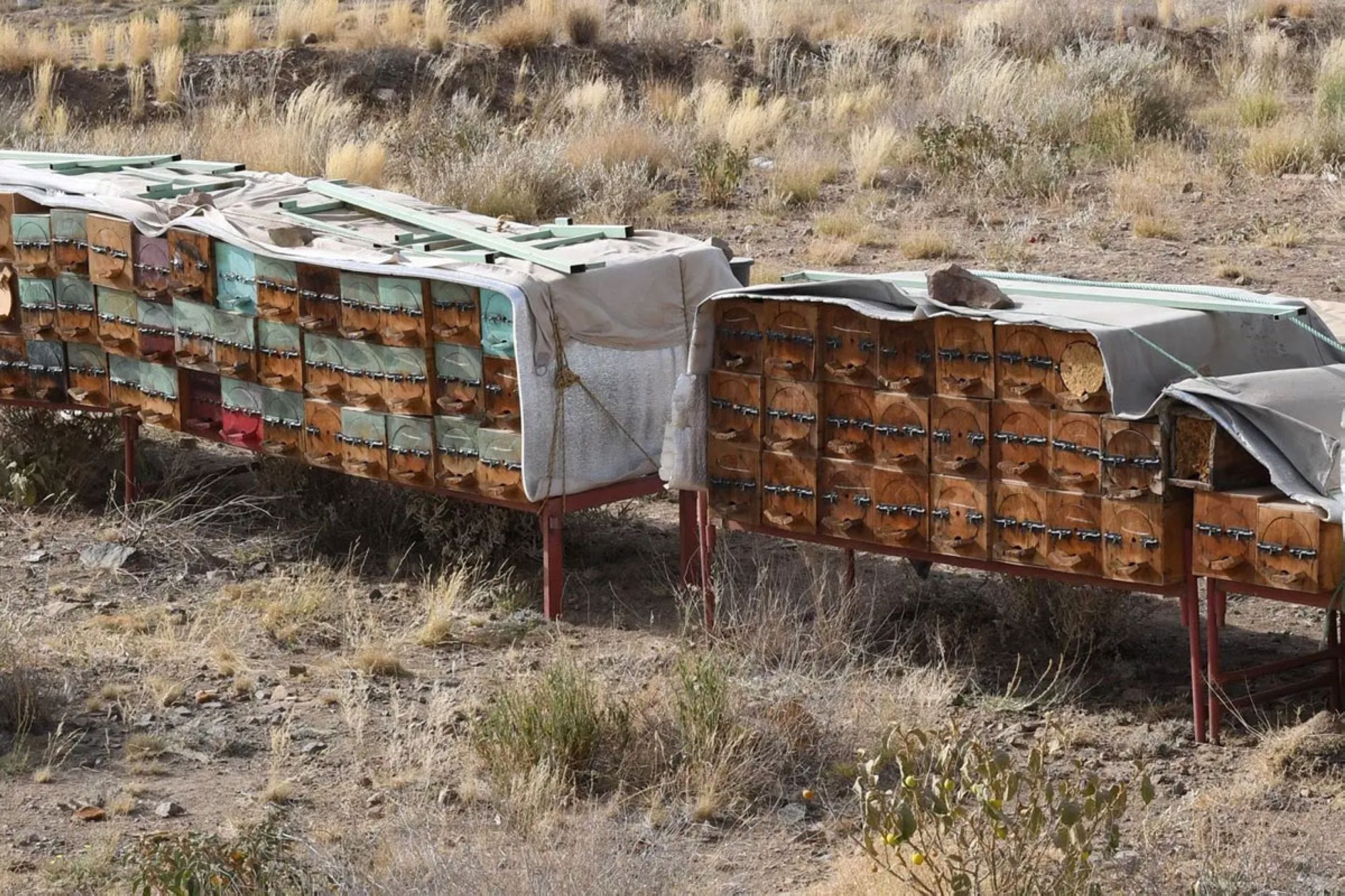
Supporting beekeeping in Saudi Arabia
Several governmental entities collaborate to support beekeeping, including the Ministry of Environment, Water, and Agriculture, the Beekeepers Cooperative Association, the Bee Research Unit, and Saudi Aramco. They provide support to beekeepers and promote beekeeping culture. Various projects have been launched to foster the beekeeping profession and honey production within a framework overseen by governmental entities. Among these is the project focused on building and enhancing national capacities by training young Saudis to take up the beekeeping and honey production profession. It is one of the projects launched by the Human Capability Development Program under Saudi Vision 2030.
The Ministry of Environment, Water, and Agriculture is the primary governmental entity supporting beekeeping. It provides logistical and advisory services to approximately 8,800 beekeepers, who manage around 1.8 million beehives.
The ministry contributes by offering advisory services and introducing beekeepers to modern beekeeping methods through eleven advisory apiaries across different provinces of the Kingdom. Additionally, it provides queen bee breeding stations and packages of bees. Through the Beekeeping and Honey Production Development Initiative, the ministry runs programs to improve, develop, and preserve local bee strains, organize, grow, and protect beekeeping pastures, enhance the skills of beekeepers, develop advisory services in the beekeeping field and scientific research, and protect bees from harm.
The Agricultural Development Fund, affiliated with the Ministry of Environment, Water, and Agriculture, offers fixed beekeeping financing as part of its sector-specific financing services. This is in line with the fund's partnership in providing credit services and in collaboration with other specialized entities supporting beekeepers. The fund provides technical, marketing, and training services to its clients as part of the financing program. The importance of this financing lies in its contribution to covering the operational costs of licensed fixed beekeepers.
In the educational context, Saudi faculty members specializing in beekeeping at universities across the Kingdom contribute to research and projects aimed at developing beekeeping practices and addressing related challenges and obstacles. King Khalid University in Aseer has initiated the establishment of a dedicated unit for bee research and honey production to enhance the university's scientific role in promoting beekeeping and honey production as a profession that contributes to environmental balance and self-sufficiency in honey products.
Saudi Arabia's efforts to enhance livestock wealth
Efforts of the Ministry of Environment, Water, and Agriculture to develop the camel sector
The Ministry of Environment, Water, and Agriculture established the Prevention Center to protect camels from plant and animal diseases and their vectors. They also created the Genome Laboratory, specializing in identifying the lineage and genetic codes of camels. Additionally, an electronic platform (Anaam Platform) was launched to register data of camel breeders. The ministry provides veterinary, preventive, advisory, and therapeutic services through 180 veterinary clinics and offers diagnostic services for various animal diseases through twelve equipped laboratories. They also inspect camel shipments and ensure they are disease-free through veterinary quarantine facilities.
Initiatives to develop the cattle farming sector
The Ministry of Environment, Water, and Agriculture organized the "Improvement and Development of the Livestock Sector" initiative in Buraydah City, Qassim Province, in 2022. The initiative aims to support fodder crops and improve herd management practices to develop the livestock sector comprehensively. This development ensures the transition from traditional breeding systems to modern methods, contributing to increased production and maintaining product quality. This initiative was launched in Qassim Province, which has three million livestock, including cattle.
Poultry farming projects
The Agricultural Development Fund, a government credit institution specializing in financing agricultural activities across the Kingdom, funds various projects in the poultry sector to contribute to food security and the preservation of natural resources. It encourages the use of modern technologies to increase support and achieve a higher self-sufficiency rate for broiler projects. The fund supports farmers and encourages them to use cages to enhance production processes.
The poultry projects funded by the Agricultural Development Fund include seven types of projects: broiler chicken projects, which are dedicated to fattening broiler chickens; broiler breeder projects, which produce fertilized eggs for broiler chickens; layer chicken projects, which focus on table egg production; hatchery projects, which incubate and hatch fertilized eggs; and layer breeder projects, which produce fertilized eggs for layer chickens. Additionally, there are grandparent projects that produce fertilized eggs resulting in broiler or layer breeders.
The Agricultural Development Fund, through its new national agricultural strategy for 2021-2025, aims to increase broiler chicken production by approximately 415,000 t. In 2020, production was 947,000 t, and it is expected to rise to 1,362,000 t by 2025. This growth is intended to boost self-sufficiency to 80 percent by 2025, up from over 60 percent at the end of 2020.
By the end of the third quarter of 2023, the Agricultural Development Fund had approved funding for thirty-one poultry projects, with a total value of SAR471 million. In the previous year, 2022, the fund approved twenty-five loans totaling over SAR707 million.
Establishment of the Falcons Club
In 2017, a royal decree was issued to establish the Saudi Falcon Club, entrusting it with the responsibility of caring for falcon breeding in the Kingdom and preserving the historical heritage associated with falconry culture. The club executes several tasks, including introducing, promoting, and disseminating falconry heritage, organizing competitions and events domestically and internationally, uniting falconers under one association, holding falcon auctions, collaborating with research centers for falcon studies, and spreading awareness, training, research, and programs to protect falcons.
The Bee Research and Honey Production Unit at King Khalid University
The Bee Research and Honey Production Unit at King Khalid University includes an applied research apiary, a laboratory for analyzing bee products, a laboratory for diagnosing bee diseases, a queen-rearing laboratory, and a laboratory for producing bee venom. The presence of this unit has created job opportunities for many citizens in this field, enabling several beekeepers with modern scientific methods and tools that improve the profession of beekeeping and honey production.
The Bee Research and Honey Production Unit at King Khalid University has achieved five international awards. The unit won first and second places for the best honey during its participation in the Second International Conference of the Arab Beekeeping Association and the fifteenth Conference of the Asian Apicultural Association in 2019. Additionally, it secured third place for the best honey at the Second International Conference (Africa Bee Expo) held in Tunisia in 2019, along with two awards at the 2023 Paris International Honey Competition for the best honey in the world.
Bee Research Unit at King Saud University
The Bee Research Unit, part of the Plant Protection Department at the College of Food and Agriculture Sciences at King Saud University in the capital, Riyadh, was established as a hub for scientific research in beekeeping both within the Kingdom and beyond. The unit focuses on advancing scientific research and practical applications to enhance the beekeeping industry in the Kingdom. It operates from two locations in Riyadh Province: one on the main campus of King Saud University, and the other in Dirab, which serves as an applied research site equipped with all necessary tools for beekeeping and honey production. This site includes a research apiary and a dedicated room for extracting and producing honey and other related products.
The government is working to enhance and support the profession of beekeeping and honey production in the Kingdom. The Cooperative Association for Development of Bees Industry in Riyadh (NAHAL), was established to support these efforts. Since its inception, the association has collaborated with various governmental educational institutions, such as King Faisal University, through numerous events.
On a practical level, national events and scientific conferences on beekeeping and honey production are organized, such as the Scientific Conference of the International Honey Festival. This conference, held under the theme "Best Practices and Experiences in Beekeeping to Achieve Saudi Vision 2030," was organized by the Beekeepers Association in al-Baha in cooperation with the Ministry of Environment, Water, and Agriculture, with support from al-Baha University and the Cooperative Societies Council. Experts from the Food and Agriculture Organization of the United Nations (FAO), the International Federation of Beekeepers' Associations (Apimondia), the Arab Beekeeping Association, the Ministry of Environment, Water, and Agriculture, King Saud University, and the Agricultural Development Fund participated in the event.
Saudi regulations for preserving livestock
Regulations for importing sheep into Saudi Arabia
In 2019, the Ministry of Environment, Water, and Agriculture established mechanisms and regulations for importing live livestock into the Kingdom. The goal is to reduce the depletion of feed after livestock enters the Kingdom. The regulations include setting standard weights for each type of livestock, including cattle, lamb, goats, and camels, such as thirty-five kg for Suakin lamb, twenty-five kg for Barbary sheep, twenty kg for goats, 280 kg for cattle, and two hundred kg for camels. These measurements are subject to periodic review by the ministry.
The ministry's requirements for importing live livestock include obtaining an import permit, adhering to health requirements in the country of origin, following quarantine procedures at entry points, implementing the environmental sustainability program regarding standard weights, and ensuring immunization.
Camel tagging in Saudi Arabia
The Saudi Ministry of Environment, Water, and Agriculture tags each camel with special electronic chips. This practice aims to keep records of their numbers and types, reduce the presence of stray camels on highways, identify their owners to prevent loss or theft, and enhance livestock production. Camels that are tagged also have records maintained for their preventive programs, protecting them from epidemic diseases through response plans and treatments.
Animal welfare regulations in Saudi Arabia
In the national context of dealing with pets, the Kingdom adheres to the Animal Welfare Act of the Cooperation Council for the Arab States of the Gulf (GCC). This act has been in effect since 5 July 2013, in accordance with a royal decree.
The law stipulates that animal owners and caregivers must take all precautions to ensure that no harm, mischief, pain, or suffering is inflicted on animals. They are specifically required to provide suitable facilities and necessary living conditions to shelter animals, provide a sufficient number of qualified employees who have the appropriate capacity, knowledge, and professional competence in animal welfare matters, and inspect animals and check their conditions at least once a day.
The law also states that no animal whose survival depends on humans should be released. If there is a desire to abandon an animal, it must be coordinated with the relevant entity. The health status of the animals must be monitored, and they should be examined and treated by a veterinarian. Animals must be transported in a manner that ensures their safety and prevents injuries or harm. The act's implementing regulations specify the conditions and requirements for transportation methods.
Related quizzes
Related articles
